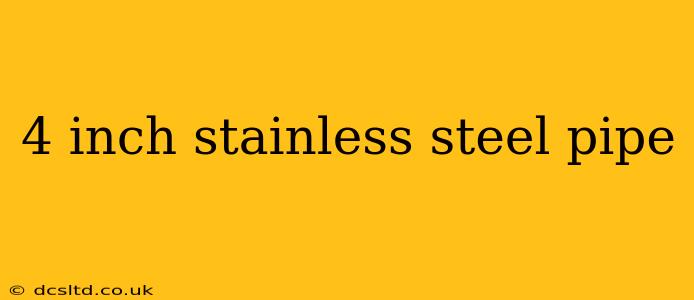Choosing the right stainless steel pipe is crucial for a variety of applications, from industrial processes to plumbing projects. This guide focuses on 4-inch diameter stainless steel pipes, exploring their properties, uses, and considerations for selection. We'll delve into common questions surrounding this specific pipe size, ensuring you have the information needed to make informed decisions.
What are the different grades of 4-inch stainless steel pipe?
Stainless steel pipes aren't all created equal. The grade refers to the specific alloy composition, influencing properties like corrosion resistance, strength, and weldability. Common grades used for 4-inch stainless steel pipes include:
- 304 (18/8): This is a versatile grade offering excellent corrosion resistance and good strength. It's widely used in food processing, chemical handling, and general plumbing.
- 316 (18/10): Offering superior corrosion resistance than 304, particularly in chloride-containing environments (like saltwater), 316 is ideal for marine applications, chemical processing, and pharmaceutical industries.
- 430: A ferritic stainless steel, 430 offers good corrosion resistance at a lower cost than austenitic grades (like 304 and 316). However, its strength and formability are lower.
What is the weight of a 4-inch stainless steel pipe?
The weight of a 4-inch stainless steel pipe depends heavily on the pipe schedule (wall thickness) and the grade of stainless steel. Thicker-walled pipes (higher schedule numbers) will naturally weigh more. You'll need to consult pipe specifications or use online calculators that allow inputting the schedule and material grade to determine the precise weight per linear foot.
What is the price of a 4-inch stainless steel pipe?
Pricing for 4-inch stainless steel pipe varies widely based on several factors:
- Grade of stainless steel: Higher-grade stainless steels (like 316) generally cost more than lower-grade options (like 430).
- Schedule (wall thickness): Thicker-walled pipes are more expensive than thinner-walled ones.
- Length of pipe: Purchasing in bulk often results in lower per-unit costs.
- Supplier and market conditions: Prices fluctuate depending on the supplier and overall market demand. It's essential to obtain quotes from multiple suppliers for comparison.
What are the applications of 4-inch stainless steel pipes?
The versatility of 4-inch stainless steel pipes makes them suitable for numerous applications, including:
- Chemical processing: Handling corrosive chemicals and fluids.
- Food and beverage industry: Maintaining hygiene and preventing contamination.
- Pharmaceutical manufacturing: Ensuring product purity and sterility.
- Marine and offshore applications: Withstanding saltwater corrosion.
- Plumbing and HVAC systems: Transporting water, steam, or other fluids.
- Industrial process piping: In various manufacturing settings.
Where can I buy 4-inch stainless steel pipe?
4-inch stainless steel pipes are commonly available from various suppliers, including:
- Metal service centers: These are wholesale distributors specializing in metals and piping.
- Online retailers: Many online platforms sell stainless steel pipes, offering various grades and schedules.
- Local plumbing and industrial supply stores: These offer convenience for smaller projects.
Remember to check supplier certifications and verify the quality of the pipe before purchasing.
How do I choose the right schedule for my 4-inch stainless steel pipe?
Pipe schedule refers to the wall thickness. Higher schedule numbers indicate thicker walls and greater pressure resistance. The appropriate schedule depends entirely on the intended application and the operating pressure. Consult relevant pressure rating charts and codes to determine the correct schedule for your project. Underestimating the required schedule can lead to leaks or pipe failure.
This comprehensive guide provides a foundational understanding of 4-inch stainless steel pipes. Remember to always consult relevant engineering standards and codes when selecting and installing pipes for any application. The information provided here is for general guidance only and shouldn't be considered professional engineering advice.
